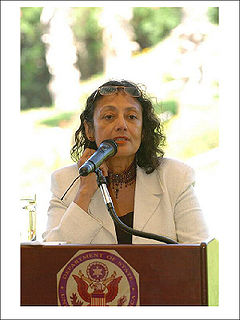A Quote by Quincy Jones
I lost my mother when I was 7 and they put her in a mental hospital. My brother and I watched her being taken away in a strait jacket. That's something you never forget. And my stepmother was like in the movie 'Precious.' I couldn't handle it. So I said to myself, 'I don't have a mother. I don't need one. I'm going to let music be my mother.'
Related Quotes
Tereza's mother never stopped reminding her that being a mother meant sacrificing everything. Her words had the ring of truth, backed as they were by the experience of a woman who had lost everything because of her child. Tereza would listen and believe that being a mother was the highest value in life and that being a mother was a great sacrifice. If a mother was Sacrifice personified, then a daughter was Guilt, with no possibility of redress.
Her mother was a Christian Scientist who didn't believe in calling doctors. So when my mother caught whooping cough as a baby, stopped breathing and turned blue, her mother revived her by spanking her on the bottom. She saw life itself as a gift and saw her own survival as precious and a matter of chance.
His love for my mother wasn't about looking back and loving something that would never change. It was about loving my mother for everything -- for her brokenness and her fleeing, for her being there right then in that moment before the sun rose and the hospital staff came in. It was about touching that hair with the side of his fingertip, and knowing yet plumbing fearlessly the depths of her ocean eyes.
One thing I did have under my belt was, my mother lost her mother when she was 11. She mourned her mother her whole life and made my grandmother seem present even though I never met her. I couldn't imagine how my mom could go on but she did, she took care of us, she worked two jobs and had four children. She was such a good example of how to conduct oneself in a time of grief. When I lost my husband, I tried to model myself as much as I could on her.
As Anna Freud remarked, the toddler who wanders off into some other aisle, feels lost, and screams anxiously for his mother neversays "I got lost," but accusingly says "You lost me!" It is a rare mother who agrees that she lost him! she expects her child to stay with her; in her experience it is the child who has lost track of the mother, while in the child's experience it is the mother who has lost track of him. Each view is entirely correct from the perspective of the individual who holds it .
Sometimes we adopt certain beliefs when we're children and use them automatically when we become adults, without ever checking them out against reality. This brings to mind the story of the woman who always cut off the end of the turkey when she put it in the oven. Her daughter asked her why, and her mother responded, "I don't know. My mother always did it." Then she went and asked her mother, who said, "I don't know. My mother always did it." The she went and asked her grandmother, who said, "The oven wasn't big enough."
When Eve was brought unto Adam, he became filled with the Holy Spirit, and gave her the most sanctified, the most glorious of appellations. He called, her Eva--that is to say, the Mother of All. He did not style her wife, but simply mother--mother of all living creatures. In this consists the glory and the most precious ornament of woman.
I mean, her father was an alcoholic, and her mother was the suffering wife of a man who she could never predict what he would do, where he would be, who he would be. And it's sort of interesting because Eleanor Roosevelt never writes about her mother's agony. She only writes about her father's agony. But her whole life is dedicated to making it better for people in the kind of need and pain and anguish that her mother was in.
Mother Teresas detractors have accused her of overemphasizing Calcuttans destitution and of coercing conversion from the defenseless. In the context of lost causes, Mother Teresa took on battles she knew she could win. Taken together, it seems to me, the criticisms of her work do not undermine or topple her overall achievement.
Elizabeth’s hands flew to her mouth; tears filled her eyes with happiness as she realized he was fulfilling yet another of her and her mother’s intended activities. “Why are you fulfilling all of my mother’s dreams?” she asked, studying his face and searching for answers. “So you don’t run away like she did in search of them,” he replied, taking her hand. “Come on, join in!” he said, leaping around.
Mother Teresa's detractors have accused her of overemphasizing Calcuttans' destitution and of coercing conversion from the defenseless. In the context of lost causes, Mother Teresa took on battles she knew she could win. Taken together, it seems to me, the criticisms of her work do not undermine or topple her overall achievement.


































